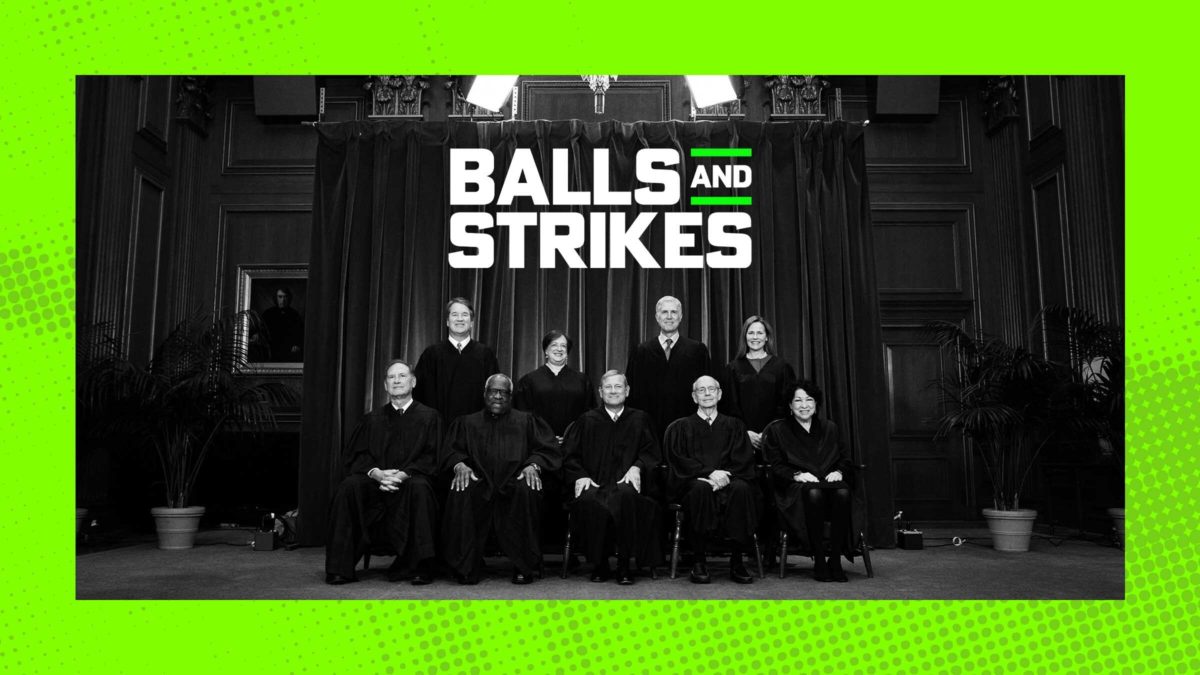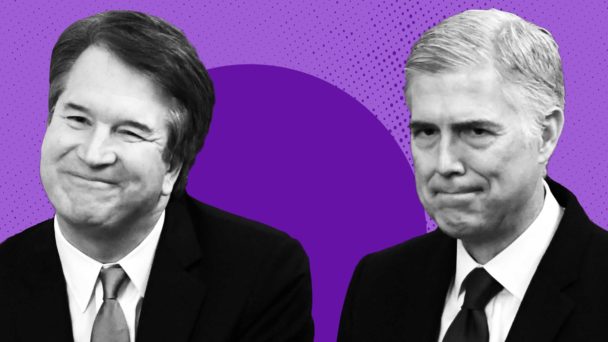Last month, a former evangelical leader named Rob Schenck alleged that in 2014, Justice Samuel Alito leaked the outcome of a landmark Supreme Court case about contraceptive access, Burwell v. Hobby Lobby Stores, to conservative activists Don and Gayle Wright. Schenck’s account, published in the New York Times, details a coordinated, years-long effort by prominent figures on the religious right to curry favor with sympathetic justices. The payoff included front row seats, literally and figuratively, to the Court’s ongoing reimagination of the First Amendment as a guarantee of Christian supremacy.
The Wrights had attended the Hobby Lobby arguments in “seats from Sam and Nino” and then went to dinner with “Sam” and his wife in between arguments and the opinion’s release. pic.twitter.com/qWhQDS8VJQ
— Chris “Subscribe to Law Dork!” Geidner (@chrisgeidner) November 19, 2022
The revelation that Alito, who has called more recent Supreme Court leaks “grave betrayals of trust,” might be the culprit in a different high-profile leak would be equal parts hypocritical and scandalous. Fortunately, however, the Court’s in-house counsel—yes, this country’s fanciest lawyers have their very own fancy lawyer—needed only a few days over a holiday weekend to confirm that there is absolutely nothing for anyone to worry about.
“Justice Alito has said that neither he nor Mrs. Alito told the Wrights about the outcome of the decision in the Hobby Lobby case,” wrote Ethan Torrey in a November 28 letter to Senator Sheldon Whitehouse and Congressman Hank Johnson, both Democrats. The justice maintained a “casual and purely social relationship” with the Wrights, Torrey continued, and “never detected” any effort to influence his decisionmaking process.
Torrey went on to explain that in the context of judicial ethics, the term “gift” excludes “social hospitality based on personal relationships”—food, lodging, and the like. Thus, the fact that the Wrights regularly dined with conservative justices can be chalked up to their mutual appreciation for well-cooked steak. The Wrights hosting Alito and his wife at their Jackson Hole retreat, too, is just a fun story about good friends hitting the slopes.
“There is nothing to suggest that Justice Alito’s actions violated ethical standards,” Torrey concluded. Perhaps under the impression that neither Johnson nor Whitehouse can read, he helpfully noted the Times’s acknowledgement that Schenck’s account contains “gaps.”
The U.S. Supreme Court responds to letter from Sen. Sheldon Whitehouse following recent NYT report about claim that another major ruling had been leaked back in 2014.
“There is nothing to suggest that Justice Alito’s actions violatd ethical standards.” pic.twitter.com/TRg5UaV485
— Andrew Chung (@andrew_chung_) November 28, 2022
You do not need to be a lawyer to understand that as a response to the Times’s reporting, this blustery quasi-denial is about as hollow as it gets. In the face of specific allegations of misconduct on the part of Sam Alito, the principal point offered in Sam Alito’s defense is that Sam Alito pinky-swears that he did nothing wrong. Torrey borrows heavily from Alito’s denial, occasionally parroting its language verbatim. He calls Schenck’s account “uncorroborated,” which astute readers will note is not the same as, for example, “disproven” or “false.” The letter is best understood as a hand-waving press release printed on Supreme Court letterhead in the hopes that someone, somewhere will be impressed by it.
Torrey’s handling of the ethical issues is heavier on citations, but maybe even lighter on substance. He correctly notes that under Judicial Conference gift regulations, judges are not supposed to accept gifts from people “whose interests may be substantially affected” by the judge’s decisions. Because the Wrights “have never had a financial interest in a matter before the Court,” he concludes, no ethical violations took place.
This reasoning ignores what is obvious to anyone without a terminal case of lawyer brain: A wealthy right-wing activist need not have a financial stake in a dispute about contraceptive access in order to have a vested interest in the outcome. It echoes the dead-end formalism of the Court’s 2010 decision in Citizens United v. FEC, in which five justices decided that only quid pro quo political corruption—money for political favors—is within the government’s power to regulate. Cabining the concept of a “conflict of interest” to instances in which a rich guy hands a cash-stuffed briefcase to a powerful one is a different way of saying that in American democracy, some kinds of corruption are bad, and others are not.
The more fundamental problem, unmentioned by Torrey, is that Alito and his colleagues are not actually subject to the Judicial Conference gift regulations, or to any binding ethics code at all. This is perfectly fine by Chief Justice John Roberts, who has long argued that “ethical considerations unique to the Supreme Court” make adoption of the Code of Conduct for United States Judges, which (as you might guess) applies to all other federal judges, impractical. If Roberts has ever considered doing the work of drafting a new code of ethics—one that does account for whatever he thinks makes the Supreme Court special and different—completing that project does not seem to be high on his priority list. To the extent that Torrey’s letter gets the law right, it is a damning indictment of the law’s inadequacy.
Nine unelected, life-tenured justices should be of course subject to greater than zero ethics rules, for the same reason that grizzly bears at the zoo are kept in secure enclosures to prevent them from mowing down terrified zoo patrons who enter their fields of vision. But this entire episode lays bare the intractable brokenness of the Supreme Court that cannot be fixed by a few clever, technical rule changes: The thrust of Torrey’s response here is that Supreme Court justices, as civil servants who have sworn oaths to discharge their duties “faithfully and impartially,” can and should be trusted to regulate themselves. The people who claim the ultimate authority to “say what the law is” have also placed themselves above it.
As always, you can find us at ballsandstrikes.org, or follow us on Twitter at @ballsstrikes, or get in touch via [email protected]. Thanks for reading.
This Week In Balls & Strikes
Samuel Alito Is Exactly Who You Thought He Was, Jay Willis
Judge who insists judges are not politicians sure acts a lot like a politician.
How a Law Passed to Protect Native Spirituality Supercharged the Christian Supremacy Movement, Yvette Borja
The Religious Freedom Restoration Act was supposed to protect everyone. The Supreme Court’s conservatives had other ideas.
Conservative Judges Are Helping the “Freedom of Contract” Stage a Dramatic, Dangerous Comeback, Lisa Needham
The backlash to COVID-19 safety measures has some academics playing footsie with one of the worst ideas in legal history.
Missouri Couldn’t Wait to Kill Kevin Johnson, Yvette Borja
In Missouri, 19-year-olds are old enough to be put to death by the state, but not old enough to be present for it.
This Week In Other Stuff We Appreciated
An Unequal Liberty, Lisa Heinzerling, The Atlantic
At this Supreme Court, rich people get it. Others don’t.
How the Supreme Court Is Erasing Consequential Decisions In the Lower Courts, Lisa Tucker and Stefanie A. Lindquist, The New York Times
The justices are using a previously obscure procedural tool to wipe key civil rights decisions off the books.
A Rogue Trump Judge Has Thrown the Supreme Court In Disarray, Ian Millhiser, Vox
Government by some FedSoc drone in Texas: Just as the Framers intended!
How the Supreme Court Plans to Undermine Future Elections, Simon Lazarus, The New Republic
Democrats fared better than expected in 2022. They still have to deal with the Supreme Court.
This Week In Obscure Photos of Supreme Court Justices On Getty Images





